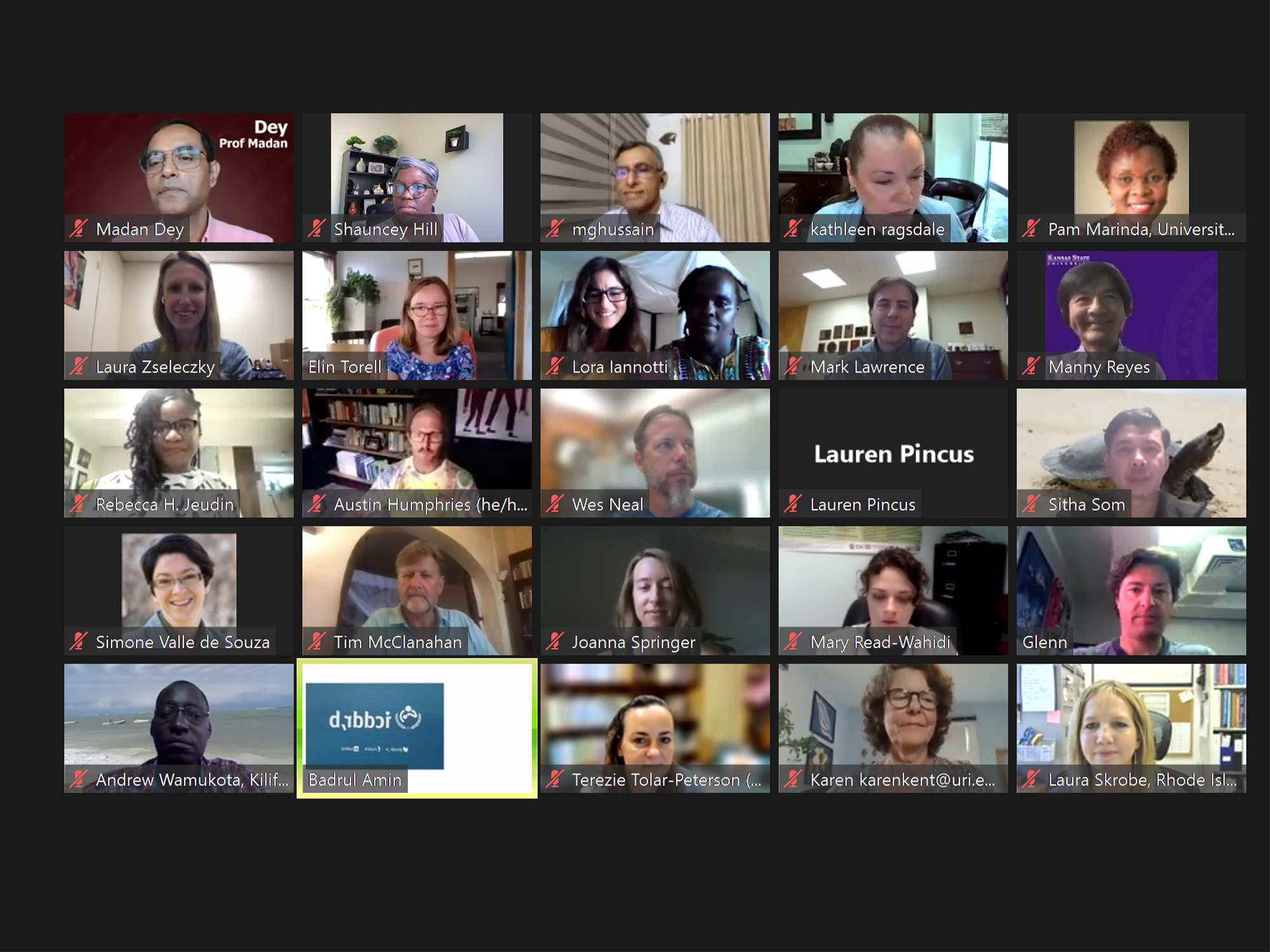
By Alaina Dismukes
From August 9-11, the Feed the Future Innovation Lab for Fish held their 2021 Annual Meeting. The internal meeting held via Zoom brought together all project teams to take part in group discussions and listen to presentations in order to continuously improve the teams’ research efforts.
Reflecting on how the Annual Meeting benefited the research teams, Mark Lawrence, Fish Innovation Lab Director, and Elin Torell, Fish Innovation Lab Deputy Director, agreed that the meeting provided a good opportunity for the teams to learn from each other.
“I think it helps our teams a lot to hear the successes of the others and the challenges they are facing,” Lawrence said. “Hearing other teams’ successes can inspire and motivate them, and hearing about other teams’ challenges lets them know they’re not alone. Hearing how other teams overcame challenges also can provide potential approaches they haven’t thought of before.”
“By preparing for the meeting, it gives the research teams a chance to internally take stock of where they are,” added Torell. “Also, through watching each other’s presentations, they found out the other teams’ struggles and successes, which helped put their own efforts into a broader perspective.”
Throughout the Annual Meeting, the project teams presented their research, expressing last year’s wins and challenges, discussing plans for the upcoming year, and answering others’ questions.
“What impressed me the most about the presentations was the interactions and discussions between the teams, which is what I was hoping for,” Lawrence said. “As a session moderator, I tried to prepare questions to ask after each presentation, but I rarely had to use my questions because other teams asked such good questions. There was excellent exchange of ideas, and teams also volunteered information and learnings during the discussions.
“A common theme I noted is the level of stakeholder engagement that the teams are implementing. They are doing an excellent job of getting into the field and collecting data from farmers, fishers, or consumers and delivering trainings directly to them. They are also engaging and using end-users for data collection for the research projects, which gets the end-users invested in the research and the outcomes.”
Members of the Fish Innovation Lab’s Executive Advisory Board also provided reflections and guidance to the projects based on the three days of presentations and discussions.
On the last day of the meeting, Torell led a research agenda workshop, so that teams representing each of the Fish Innovation Lab’s Research Strategy Areas of Inquiry could draw up an action plan for how they will address their research question in the fiscal year 2022. This included identifying joint activities, communications products, and events as well as a team leader for each item.
“Each of the groups took a different approach to answering the questions,” Torell said. “Group 1 (Improving Productivity) outlined what the different projects are doing in relation to the question, and then they identified three areas/challenges that cut across their projects: stakeholder engagement, COVID-19 challenges, and how to adapt funding to overcome travel limitations.”
Group 2 (Mitigating Risk) discussed collaborating by using the same questionnaires (e.g., the knowledge, attitudes, and practices survey), which will allow them to collect and compare data across the teams. This will allow the teams to create a meta-analysis of the survey results.
“Group 3 (Improving Human Outcomes) identified a list of actions they can do together such as publish their materials (training modules, mobile apps, fish literacy exam, etc.) on a joint online platform,” Torell said.
In addition to project presentations and group discussions, keynote speakers addressed broader issues relevant to the Fish Innovation Lab’s activities. Dr. James Gaffney, General Development Officer of the Bureau for Resilience and Food Security for USAID, was Monday’s keynote speaker. During his presentation, he talked about the product life cycle, a decision-making tool and process that can bring together multiple collaborators to effectively develop and scale technologies and innovations. Later, a rapid-fire session further discussed how to apply the product life cycle approach.
Tuesday’s keynote speaker was Dr. Nyawira Muthiga, Director of the Marine Program in Kenya and Conservation Scientist for the Wildlife Conservation Society. Speaking from her research and extension experience, she provided the teams with information on how to engage effectively with communities and end users.
The meeting also highlighted six student posters. The six students represented different project teams and presented posters that were displayed in a virtual poster hall and described their roles in the research process. Additionally, on Monday and Tuesday, meeting participants had an opportunity to directly ask the students questions about their research during a live Q&A session.
“I love getting students involved in our meetings and seeing their projects,” Lawrence said. “They are the future of aquaculture, fisheries, and nutrition, and they are one of the primary long-term effects of the Fish Innovation Lab. I think having the students interact with our principal investigators and co-principal investigators is a critical part of their learning experience, and it allows the students to connect and build their networks.”
Torell added that the posters allowed the students to provide a snapshot of research that they have been involved in.
“The student poster presentations were great, and we should definitely encourage more students to prepare posters in future meetings,” Torell said. “The Annual Meeting helped us take stock of the current year at the same time as it acted as a springboard for succeeding with our upcoming year. We look forward to building on the lessons learned from the 2021 Annual Meeting to adapt and refine the Fish Innovation Lab’s work to improve nutrition, food security, and livelihoods through sustainable aquaculture and fisheries systems.”
Published August 26, 2021
